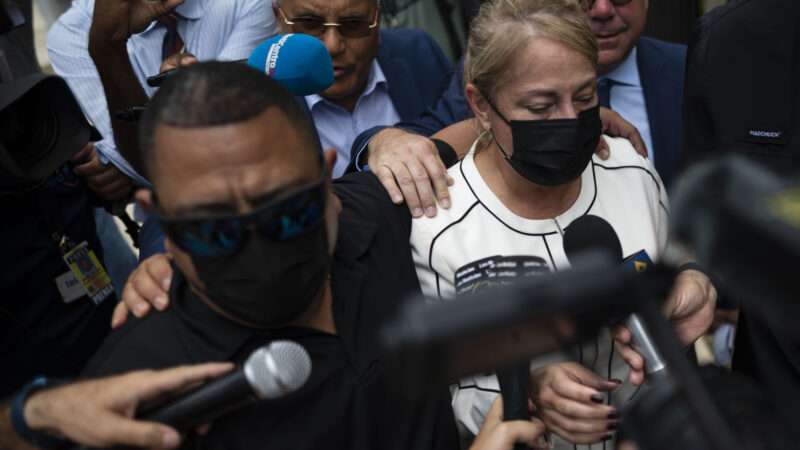
As reports surfaced of an FBI raid on Mar-a-Lago, the Florida residence of former President Donald Trump, many Americans may have missed reports of an FBI investigation of a different chief executive that went down just a week earlier.
Last Thursday, the Department of Justice announced that the FBI had arrested Puerto Rico's former governor, Wanda Vázquez, at her home in San Juan. A grand jury indicted Vázquez and several co-conspirators on charges of bribery and wire fraud. Prosecutors allege she conspired with Julio Herrera Velutini, a Venezuelan banker, and others to secure donations for her re-election campaign. The indictment claims that, in exchange for financial support, Vázquez promised to appoint banking regulators of Herrera's choice to the island's top banking watchdog (which was investigating Herrera at the time).
Vázquez, who denies the allegations, became the island's governor in August 2019 amid a succession crisis following the resignation of Governor Ricardo Rosselló, who stepped down after vulgar messages he exchanged with aides mocking Puerto Ricans suffering after Hurricane Maria became public. In case of the death, resignation, or impeachment of a governor, the island's constitution allows the secretary of state to take over as governor. At the time of Rosselló's resignation, the island had no secretary of state, paving the way for Vázquez, then the justice secretary, to take over.
After a series of major earthquakes rocked Puerto Rico in December 2019 and January 2020, Vázquez was criticized for her response and faced ethics probes over her handling of federal aid money. She also led Puerto Rico through the early stages of the COVID-19 pandemic, instituting aggressive curfews and lockdowns.
Corruption in Puerto Rico has long been a sore point in relations between the U.S. and the territorial government, especially given the island's growing dependence on federal funding in recent years. In Fiscal Year 2021, the federal government gave Puerto Rico over $65 billion in grants, direct payments, and loans to support the island's economy during the pandemic. Hurricane Maria recovery alone is expected to cost U.S. taxpayers upwards of $50 billion. Back in 2019, President Trump lashed out at the island's leaders for "robbing the U.S. government blind" and purportedly held back disaster relief funds, fearing officials would mismanage them.
Vázquez's arrest comes amid a wide-reaching federal crackdown on corruption in Puerto Rico. Back in 2019, federal agents arrested Puerto Rico's education secretary, Julia Keleher, and the executive director of the island's Health Insurance Administration, Ángela Ávila Marrero, among others, alleging they schemed to steer over $15 million in rebuilding contracts to certain contractors and consultants. Though The Miami Herald, Forbes, and others have since questioned how Keleher in particular was to blame for the post-Maria contract issues, Keleher became an early flashpoint in the public outcry over government corruption. In September of that same year, former FEMA administrators on the island and the head of an Oklahoma-based energy company were arrested on charges that they participated in a $1.8 billion bribery scheme around the rebuilding of the island's electric grid, which was completely destroyed after Hurricane Maria hit the island in 2017.
Since December 2021, at least six of the island's 78 mayors have been charged by federal prosecutors for crimes ranging from bribery, kickbacks, and even extortion. Members of a Super PAC with possible links to current governor Pedro Pierluisi were also arrested on charges of falsifying donor information on federal disclosure forms. Many high-profile members of the Puerto Rican House of Representatives and Senate have also faced bribery, fraud and perjury allegations in recent years. Just this morning, federal agents executed a search warrant at the offices of Puerto Rico's Department of Education amid an unknown investigation.
As members of Congress and Puerto Rican politicians advance legislation granting the territory statehood, these arrests and investigations loom large, leaving some experts wondering whether Puerto Rican statehood without reforms to the island's government institutions would benefit the island or the country.
For Puerto Ricans, these developments have shaken public confidence in the territory's government. "There are so many politicians accused and rumors that more arrests are coming," Benjamin Torres Gotay, a reporter and columnist for El Nuevo Dia, a Puerto Rican newspaper, told NPR back in May. "This all creates the sensation that the government is no more than a pinata that corrupt interests can come and pillage."
The post Former Puerto Rico Governor Latest Official Arrested in DOJ Corruption Crackdown appeared first on Reason.com.







